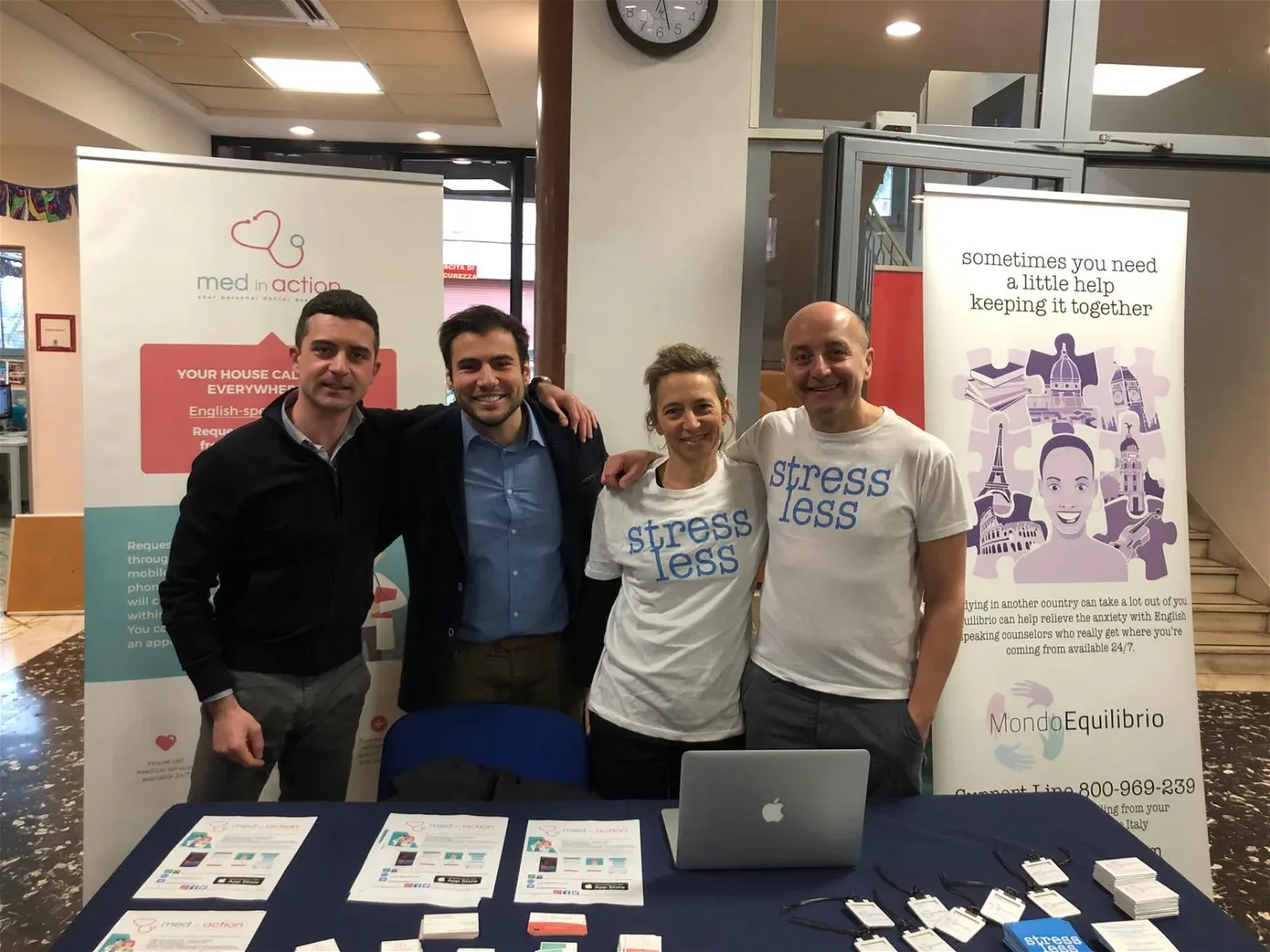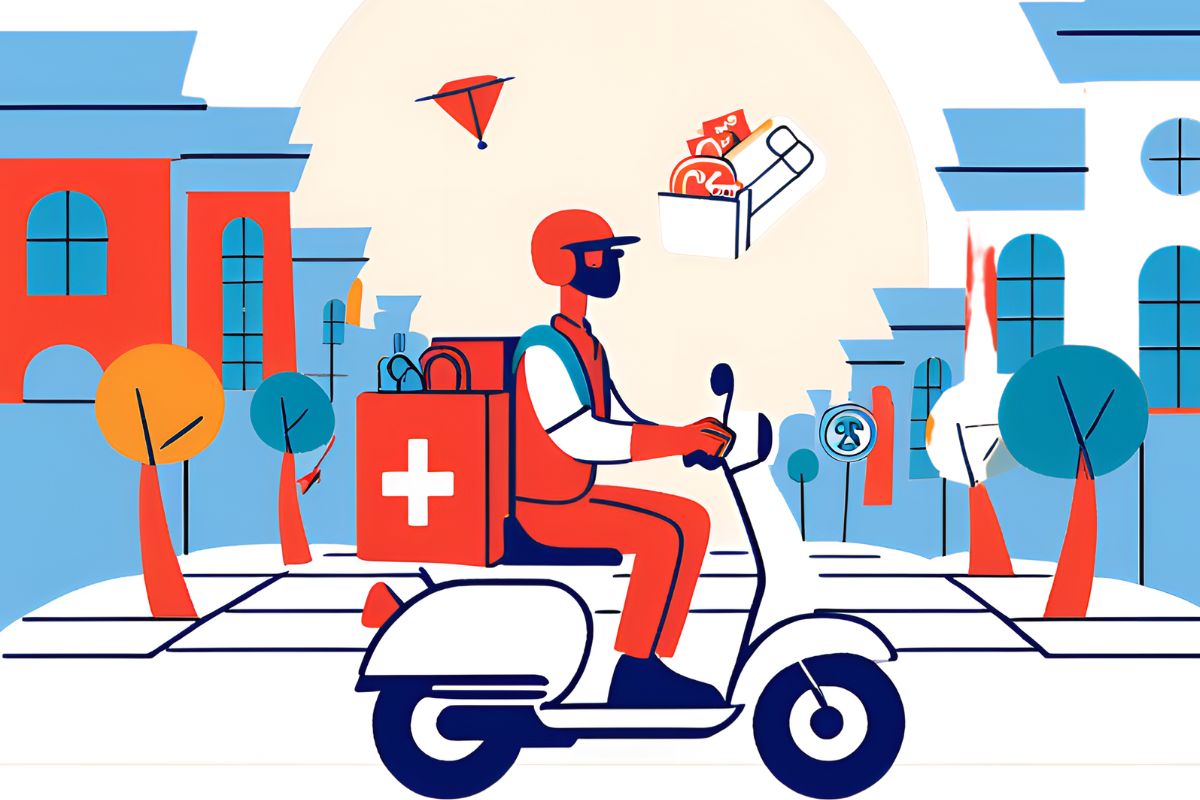Dr. Georgiou is a psychologist from the UK who is the founder of Mondo Equilibrio, a company that provides 24/7 counseling and helpline services to students studying abroad in different parts of the world, including here in Italy. They also connect students with consultants and psychotherapists for face-to-face mental health support to make sure that international students have access to independent and confidential assistance, support, and advice. First established in Rome, Mondo Equilibrio is now available in most of the major European cities, such as Amsterdam, London, Paris, etc. Their services include both preventative and responsive care, whereby students can benefit from unlimited use of the Equilibrio 24/7 toll-free support line, and confidentially speak with English-speaking experts about any issue they may face while studying abroad. Last week, I had the opportunity to sit down and speak with him about his work and learn more about the mission of his company.
Could you tell me more about the services Mondo Equilibrio provides?
We have a 24/7 helpline for students abroad. We have a referral service, so in each of these cities we work in, students can fill an online form and then we refer them to an English speaking psychiatrist, psychotherapist, psychologist, or counselor.
Where did this idea come from?
It came from an American concept called employer system program. Medium to large multinational companies provide 24/7 counselling helplines to their employees. The idea is to combat sickness absences and work related stress. If you are struggling with something in life, you are going to be less able to do your job correctly. They offer it free and confidentially to their employees so they can perform better at work. I used to work there a lot when I lived in the UK
When I moved to Italy, I started working with study abroad program providers. I applied the same concept to study abroad students and realized that there is a great need in Rome for good English speaking counselors and psychotherapists. I began to realize that a lot of students did not need a full psychiatric screening. They just needed help in the moment. They needed someone to talk with and help them deal with anxiety. Therefore, I created this helpline. If they are having a panic attack at 3 in the morning or they are feeling sad, they can always have someone to speak to.
“If they are having a panic attack at 3 in the morning or they are feeling sad, they can always have someone to speak to.”
We also put them in touch with the most appropriate professionals for the student. This part is paid by the student’s insurance. At the moment, this relationship is between the therapist and the student. So we step out.
How did you build up this network of therapists and trained professionals in your company? How long did it take?
It is still an ongoing process! It started in Rome 2 years ago. Universities have a contract with my company, whereby they pay an annual fee which covers access to our website and the helpline. We now have helplines in: Rome, Florence, Madrid, Paris, and London. Over the last 2 years, I’ve been going a lot to these cities to meet and recruit the therapists for my company. The hard part is convincing universities to sign the contract with us.
How do you convince them?
For start, students in America generally have psychiatrists and therapists anyway. So, the time when students needed the most, which is when they study abroad in a different environment where they are out of their comfort zone, it is often when they have the least support. Therefore, we tell them we are just trying to fill the gap so students can still have access to this services when they go abroad. So it is sort of a continuation.
It is easier to persuade local programs (such as study abroad programs) than home schools. Study abroad programs spend much of their time listening to students problems and they feel unqualified to help them. It really helps them because we take care of everything.
“Study abroad programs spend much of their time listening to students problems and they feel unqualified to help them.” How home schools or native people here think about mental health? Is there a stigma around mental health?
I feel there is a stigma around mental health all around the world. This is why I try to normalize it. This is just not about treating people with depression or anxiety. This is about understanding that there is a normal reaction to studying or living to the other side of the world and being away from home. Around 1% of American people between the ages of 19 and 22 study abroad. It is a tiny amount. In that age group, it is quite an unusual and extreme decision. In life, when you make extreme decisions, it comes with normal reactions.
“Around 1% of American people between the ages of 19 and 22 study abroad. In that age group, it is quite an unusual and extreme decision. In life, when you make extreme decisions, it comes with normal reactions.” Are you looking to expand your company to other populations?
Yes. I am about to go to Amsterdam in 2 weeks to create an app. The app will help you find a therapist in your area. Once we get the app up and running, it will be divided into three sections: study abroad students, employees of companies, and expats from anywhere around the world.
Do you work together with MedinAction?
Yes! We do a wellness week together at John Cabot University. I work on supporting the parents, the students, and giving all of the emotional and psychological support that they need. We taught professors how to deal with the death of students.
Have you faced any other difficulties while working in this company?
The most difficult one has been dealing with a student death last november, which was a horrible accident. Asides from that, universities call us when they don’t know how to deal with certain situations.
For example, hosts of a homestay often require our support. Sometimes, the homestay family realizes the student is not eating in family dinners. Then the homestay notices there might be eating issues. How do they handle that situation? Do they leave the student alone or insist him/her to join them for dinner? That’s where we come in and help them navigate through those issues.
Last week, I had a situation with a university in another European city where there has been allegations of racism. There was actually a racist attack combined with some bullying. The university needed help in how to tackle this problem and we provided this help. For example, I help them to prepare a meeting with the students on what to say, what to do, how to manage the crisis, etc. Often we do training with the university staff. For example, noticing if drugs are being sold by students in order to prevent addictions.
How do you come in touch with these institutions? How do you market your product?
Mainly, word of mouth, but I really need to step it up and work more on my marketing!
How would you promote the service that you have in way that is approachable, but also reaches a lot of people?
We need to let people know that we are there. By letting them know that we are there, we basically explain what we do and what we offer. We help them understand that by bringing a company like Equilibrio, you have more control of the situation.
Is there a recurring theme that you have encounter in Rome, specifically?
Anxiety is massive!
Many Americans students come over medicated. They have anxiety medication. However, that same amount of medication in a different and stressful (just because it is new) environment, will have a different impact or effect. So, medication not working any longer is a big issue. Students also don’t know or are scared to integrate culturally. Essentially, Americans are being seen as the stereotype they do not want to be. This is the stem of a lot of problems.
One of the biggest issues is also what happens after students have stepped out of their comfort zone. For example, when you’re back at home and you’re dreaming of studying abroad, you have hopes of getting out of your cocoon, growing differently, becoming independent. You want to sit in piazzas, drink coffee, and read a book. That’s all very nice, but what does that really feel like when you get there? Getting out of your comfort zone feels really uncomfortable. And none of us are used to being uncomfortable! Going to sit in a sunny piazza with a coffee and a book sounds like a glamorous idea when you’re home; but when you’re actually here, well you’ve gotta get up in the morning, you’ve gotta leave your apartment (probably on your own), then you walk, look around and think “why am I here?” The reality of doing what you dreamed can provoke a lot of anxiety.
“Going to sit in a sunny piazza with a coffee and a book sounds like a glamorous idea when you’re home; but when you’re actually here, well you’ve gotta get up in the morning, you’ve gotta leave your apartment (probably on your own), then you walk, look around and think ‘why am I here?’”
What advice would you give to a student like me then?
First, if you are here for only one semester, you need to know and get used to the disappointment that you will not learn fluent Italian in only one semester -chuckles-.
Think about the things you love doing at home (hobbies, interests, yoga, sports). Ask your university how can you get involve in those things here. Whatever you do back home, there will be a group of young italians that do the same here. Try hard to get into those Italian groups. Italians are used to people being transient since they see so many tourists constantly and don’t necessarily want to form strong ties with people who’re staying for such short periods of time. Therefore, it’s important to manage your expectations. However, I consider they can be very welcoming.
Another thing I would suggest is to take off the lens of your own culture. For example in Italy, when you walk into a bar/shop/restaurant, it is the customer’s job to greet the people that work there. This is different from in the US, where the host greets you first. Here in Italy, it’s the world turned on its head! If you walk into a bar/shop/restaurant and don’t say “buongiorno” for instance, in the host’s perception, you’ve been really rude. So in this situation, it’s not poor customer service but it’s just things done in a very different way.
At the very least, if something looks unfriendly or not as you’d expect, there might be a reason for it that you just don’t know yet. It’s important to keep your mind open, learn, and meet new people to understand the new culture.
“If something looks unfriendly or not as you’d expect, there might be a reason for it that you just don’t know yet. It’s important to keep your mind open, learn, and meet new people to understand the new culture.”
Learn more about Dr. Georgiou’s company, Mondo Equilibrio, at mondoequilibrio.com and all the wonderful work they are doing here in Italy!




